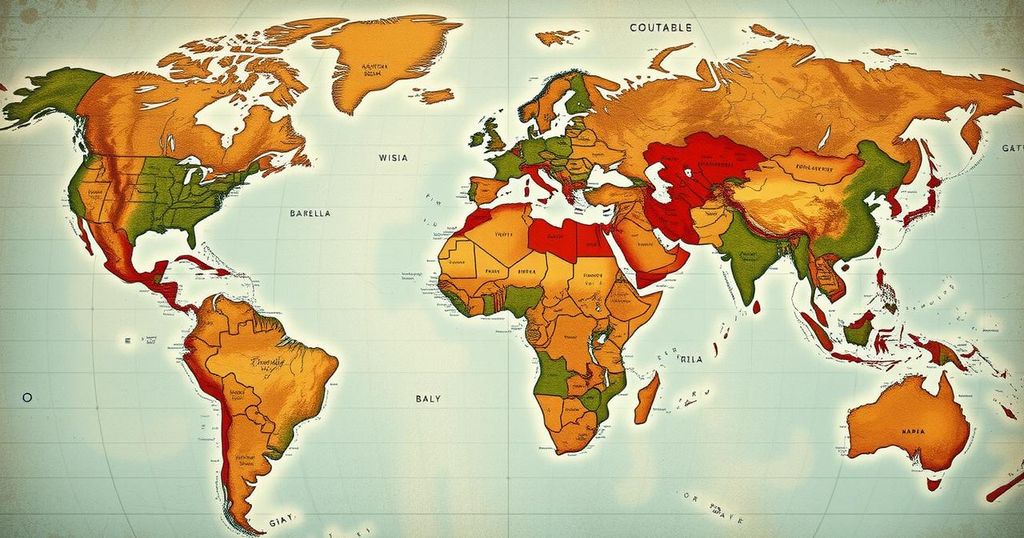Trump Issues New Travel Ban Affecting Nearly 20 Countries: What Travelers Need to Know

President Trump has signed a new travel ban affecting nearly 20 countries, citing national security concerns. The ban restricts entry for nationals from several nations, including Afghanistan and Iran, while also imposing partial restrictions on other countries. It takes effect June 9, 2025, with exemptions for certain visa categories. Travelers are urged to seek guidance from official sources regarding their situation.
President Donald Trump has announced a significant new travel proclamation that will restrict or outright ban entry for nationals from nearly 20 countries, citing concerns over national security. This measure includes bans for citizens from Afghanistan, Burma, Chad, the Republic of Congo, Equatorial Guinea, Eritrea, Haiti, Iran, Libya, Somalia, Sudan, and Yemen. Additionally, individuals from Burundi, Cuba, Laos, Sierra Leone, Togo, Turkmenistan, and Venezuela will also face partial restrictions.
In explaining the rationale behind this decision, the White House pointed out that these countries demonstrate “high visa overstay rates” and are “deficient with regards to screening and vetting.” The announcement bears a resemblance to Trump’s controversial 2017 “Muslim ban,” which targeted several predominantly Muslim nations and encountered significant backlash and legal battles. After Trump’s presidency, Joe Biden repealed that policy, calling it, among other things, “a stain on our national conscience.”
This new travel ban permits certain exceptions for lawful permanent residents, existing visa holders, and specific visa categories, as well as for individuals whose entry serves U.S. national interests, although the specifics of these qualifications remain vague. For international travelers, the implications are significant, as those applying for tourism, work, or study visas from these affected regions might face delays, or outright denials.
Anyone already in the U.S. may find it possible to renew their visas, yet the path to reentry after travel could be complicated under this new ban. Trump has positioned this move as part of his 2024 campaign promises, and it follows a recent antisemitic incident in Colorado, which he cited as a compelling reason for tightening border security and advocating for the deportation of “illegal, anti-American radicals.”
Travelers are encouraged to check the U.S. State Department’s website or speak with immigration attorneys to understand how these changes might affect them or their families back home. The full travel ban directly impacts nationals from the following countries: Afghanistan, Burma (Myanmar), Chad, Republic of the Congo, Equatorial Guinea, Eritrea, Haiti, Iran, Libya, Somalia, Sudan, and Yemen.
Those with partial restrictions hail from Burundi, Cuba, Laos, Sierra Leone, Togo, Turkmenistan, and Venezuela. The new restrictions are set to kick in at 12:01 a.m. ET on Monday, June 9, 2025, according to reporting from NBC News.
Upon arrival in the U.S., travelers from fully banned countries after this date will likely be denied entry by airlines or turned away at the airport. Conversely, nationals from partially restricted countries may be subject to heightened scrutiny and possible delays or denials, depending on their type of visa and travel purpose.
For those who have already purchased tickets to the U.S. from affected countries, consulting with airlines and the nearest U.S. embassy or consulate is advised. While limited exceptions apply, it is likely that most from the fully banned countries will face entry denials, while travelers from nations with partial restrictions could still travel under more stringent conditions. To navigate these shifting regulations, staying updated with the U.S. Department of State’s guidance and obtaining legal counsel, if needed, is strongly recommended.
In summary, President Trump’s new travel ban targets nearly 20 countries and raises important questions for international travelers. Effective June 9, 2025, nationals facing full entry bans include citizens from selected Middle Eastern and African nations, while restrictions also apply to other countries. Travelers should remain informed and consult relevant resources to ensure compliance with these regulations.
Original Source: www.usatoday.com








